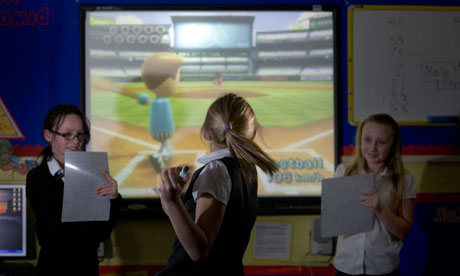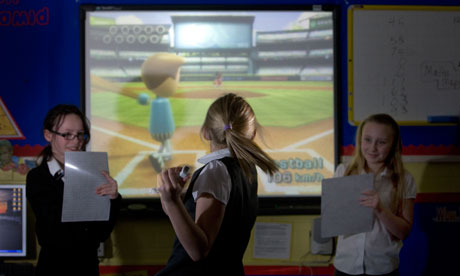Game on: using computer games to captivate your class
Head of department Ollie Bray is using computer games to get his students excited about learning. Here, he talks about technophobia, teaching and trusting kids with tech. Hannah Gould writing for the Guardian, September 14, 2012. It started with a game like Sims City had students starting at the same point with the same end goal, build a city.
Everyone takes a different route of getting there and that was the part of the process that captures and engages the imagination.

We’d send home learning tasks and each week during a review session the kids would tell me what they’d learnt. This ranged from improved understandings on pollution and drainage to better insights into local government re-elections. The proof of their learning wasn’t just in rich discussion, the class would also share screenshots of what they’d built and we’d have a top city of the week.
“Contextual Hubs” for learning is meant to take an available game and it’s up to the teacher to create educational potential around it.
The learning doesn’t come from the game itself but becomes the context for learning. If you think about Guitar Hero, it has no educational value at all, but in the hands of the right teachers, it suddenly becomes a project about music, designing CD cases, marketing the band, there are all kinds of links to it.
If you’re a teacher who can see the potential in gaming but you aren’t confident with technology, what simple pointers could you offer to help introduce it into their classroom?
If a teacher can accept they need the children to set up the console for them, the rest will take care of itself. Games are great because they produce data; one example might be Mario and Sonic at the 2012 Olympics for the Wii. After break, you can get the children to turn the console on and play the hurdles, which takes two minutes. You’ve got children writing down scores and times, and they give this information to the teacher. What they’ve done is create rich, authentic data in the context of a numeracy lesson. The teacher at no point has come in contact with the technology and just does what they’re good at, which is teach the learner.
You can feel comfortable in the domain of being a teacher and the children can feel comfortable in the domain of computer games; when these overlap that’s when it becomes a really interesting space for learning. You don’t have to take a leap out of your comfort zone, it’s about taking a little bit of a risk and trusting children with the technology.
Games-based learning has allowed teachers to do things differently. Teachers must continue to gain support from their peers across the country and the world, sharing and adapting ideas.
It’s all about impact in the classroom and I think that’s been the most wonderful stuff that’s come out of all of this, is that people have permission, to innovate and do things differently.
Convincing your school to invest in games based learning…
Firstly, we can show them the research which proves it has a positive impact. Secondly, we can put them in touch with other head teachers who have it in their schools. The third thing is to remind head teachers that, actually, what we’re talking about is not computer games, it’s play. When you get a room full of teachers to play with consoles, they might feel silly at first but they get into it! I’d never say everybody, but with most people, you kind of see this light bulb moment. If you’ve forgotten what it’s like to play and be a child, it’s difficult to communicate and therefore it’s hard to improve their learning. Many of these teachers are parents themselves but they haven’t thought that what they have at home could be useful in schools. It’s just about drawing up the dots.
Read the whole article here.

